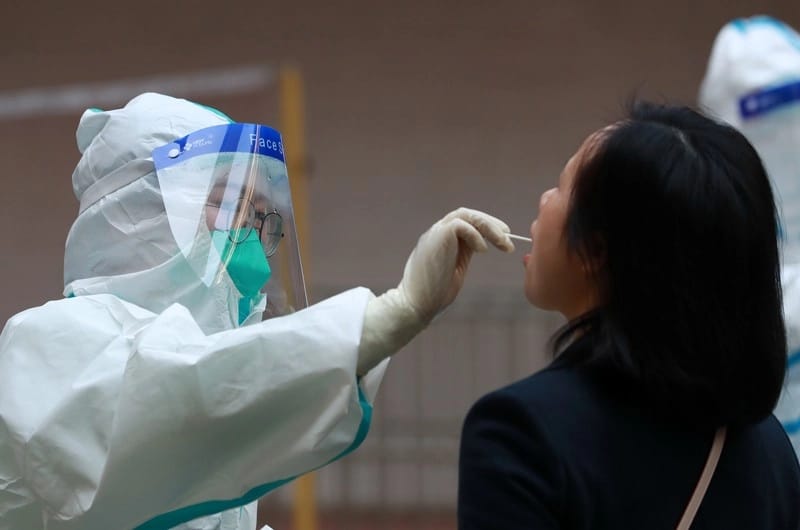This virus evokes global fears of a repeat of the covid-19 scenario, which led to global paralysis and imposed isolation on millions of people, which had profound health, economic and psychological effects on the entire world.
The outbreak of the HMPV virus comes five years after the first global alert on the emergence of the coronavirus in Wuhan, China, which later turned into a global pandemic that resulted in 7 million deaths.

What is the HMPV virus
It is a respiratory virus that causes symptoms similar to colds and flu, and although the symptoms are often mild, the HMPV virus can lead to serious complications such as pneumonia, especially in infants, the elderly and people with weakened immune systems.
Although the virus is not new, it has attracted increased attention due to the increase in cases, especially among children under the age of 14 in northern China.
It was first identified in 2001, and is spread through respiratory droplets or contact with contaminated surfaces.
Human metanemovirus (HMPV) is transmitted by respiratory droplets produced by coughing or sneezing, or through direct contact with surfaces contaminated with the virus.
While the authorities continue to monitor the situation, the global health community remains alert to the potential spread of the HMPV virus and the pressure it may impose on healthcare systems around the world.
The Centers for Disease Control and Prevention confirmed that the discovery of the HMPV virus was in 2001 in the Netherlands, and the virus was initially identified in the respiratory secretions of 28 children .

What are the most common symptoms of the HMPV virus
Symptoms of the human respiratory virus hMPV include
– Cough.
– Fever .
– Nasal congestion.
– Shortness of breath.
If untreated, the symptoms of human respiratory tract virus infection may develop into bronchitis or pneumonia, which are similar to other viruses that cause upper and lower respiratory tract infections.
What is the incubation period of the HMPV virus
According to the Center for Disease Control and Prevention the incubation period of the virus ranges from 3 to 6 days, the duration of the disease may vary depending on the severity, but it is similar to other respiratory infections caused by viruses.

How is hMPV virus infection transmitted
The HMPV virus is spread through direct contact with an infected person, it can be transmitted through respiratory droplets that are released when coughing, sneezing or talking, and the virus can also be spread by touching objects or surfaces that contain the virus and then touching the mouth, nose or eyes.
What age group is most at risk of hMPV infection
Anyone can get infected with the HMPV virus, however, children under the age of five and the elderly over the age of 65, who have a weakened immune system, are more likely to develop severe complications and symptoms.
Can you take antibiotics to treat HMPV
Dr. Sunil kumark, senior consultant in interventional pulmonology at Aster CMI Hospital in Bengaluru, India, says that antibiotics are drugs used to treat bacterial infections, and therefore they are ineffective against viruses such as herpes simplex virus because it is a viral infection, and the use of antibiotics to treat herpes simplex virus will not only be unhelpful, but may also contribute to antibiotic resistance, which is a growing concern in medical treatment.
Is there a vaccine or treatment for the HMPV virus
At the moment there is no specific vaccine available for the Prevention of human respiratory virus infection, there is also no standard treatment protocol for those affected by the virus.
Is the HMPV virus a threat to life
According to Dr. Kumar, the HMPV virus can lead to respiratory infections, especially in high-risk populations such as infants, the elderly and individuals with weakened immune systems, however, most cases are mild and self-Limited, which means that they can disappear on their own without treatment, however, in certain circumstances, especially among those with pre-existing health conditions, the symptoms of the virus can worsen, requiring more care.
How to protect against infection with the HMPV virus
There are some measures adopted by experts to protect yourself from the human respiratory virus (HMPV):
– Use soapy water to wash your hands for at least 20 seconds, especially after being in public places.
– Use hand sanitizer when soap and water are not available.
– Avoid close contact with sick people, avoid touching your face, especially your eyes, nose and mouth.
– Cover your mouth and nose with a tissue or with your elbow when coughing or sneezing.
– Clean frequently touched surfaces such as door handles, telephones and countertops regularly.
– Wear a mask in crowded or poorly ventilated places.
– Maintain a healthy diet, keep your body hydrated, exercise regularly, and get enough sleep.
– Avoid going out if you are sick to prevent spreading the virus to others.
– If you develop any symptoms, consult a healthcare professional for guidance.
– Follow the updates and guidelines issued by the health authorities to stay aware of the risks and prevention measures.
